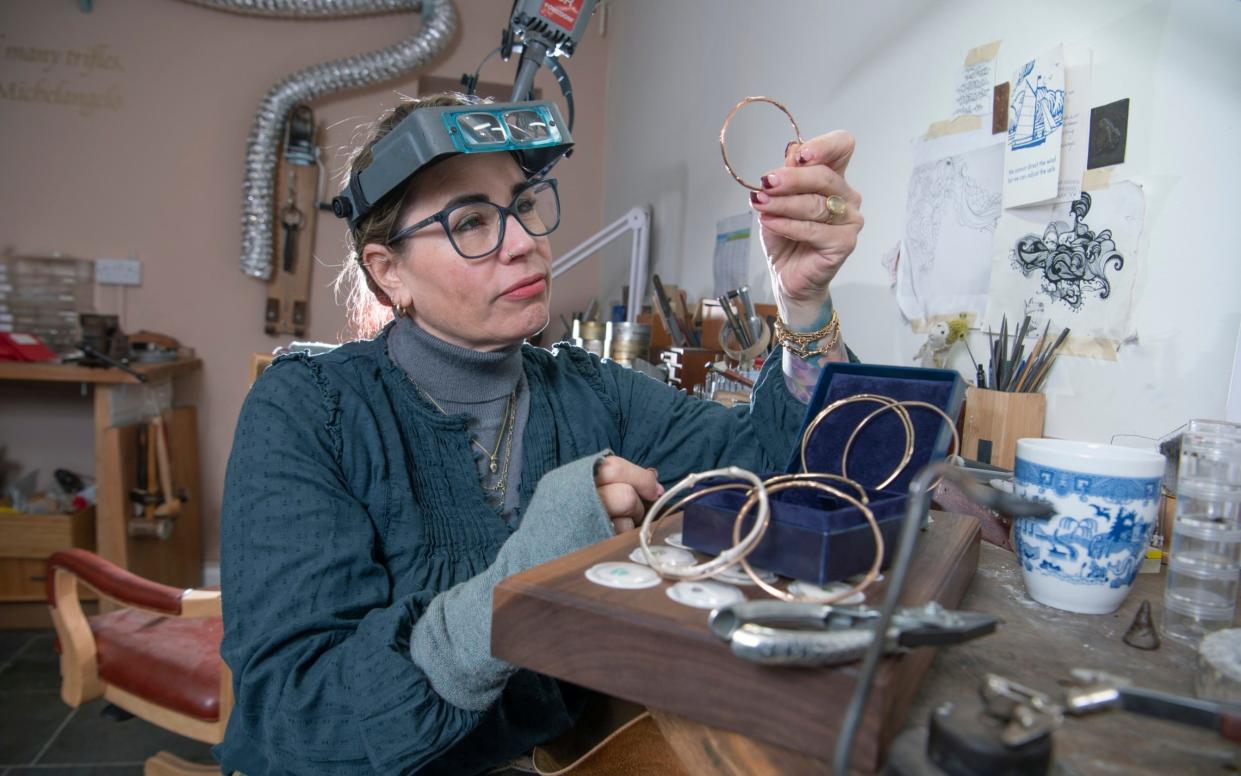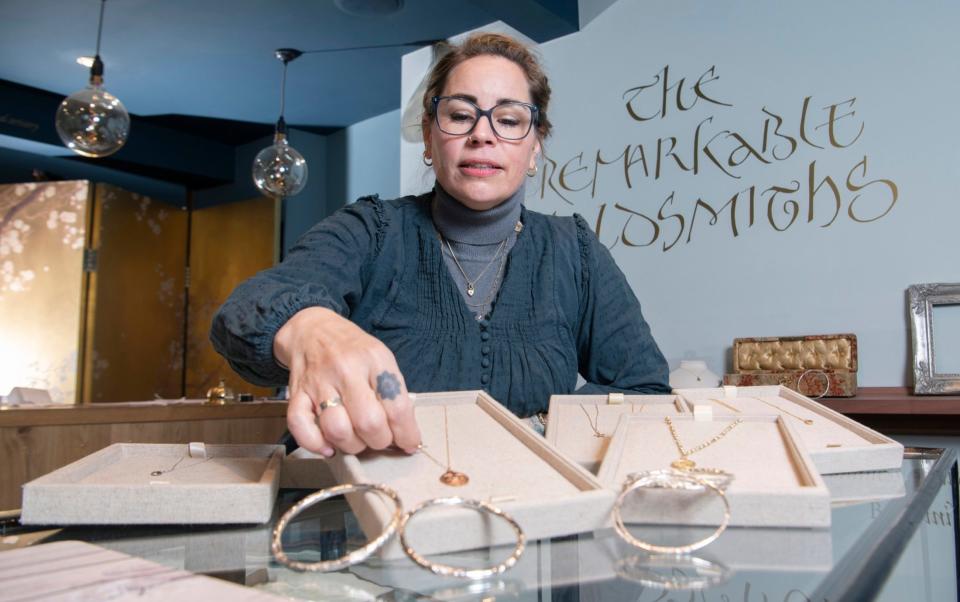‘I don’t have a pension pot. Can I afford to retire in Cornwall?’

After 20 years as a goldsmith, Isabella Day is still passionate about her trade. At her artisan jewellery workshop in Dartmouth she handcrafts bespoke, high-carat gold pieces for clients, while the firm’s online arm sells on sites such as Etsy.
“I love the craft, it’s wonderful,” she said. “It takes patience and precision. I have ADHD so I think that’s one of the reasons why I like it, because you get to really focus on things.”
Lately, however, her focus has shifted to her finances, and how she should plan for the next phase of her life.
Ms Day lives in a “really beautiful barn conversion” on a long-term let with her partner, a Japanese metalwork specialist, and three sons aged between 15 and 25.
But her “10-year goal” is to build her own house. She says: “We want some more financial security in terms of where we live.
“My grandparents lived in Cornwall and ever since I was a little girl I used to dream of having a little house that looked over an estuary.
“We just need a tiny little bedroom and a kitchen and a great big studio where we can keep on making things until we die, with a lovely view and a garden. But not a massive mansion.”
Despite being 51, Ms Day sees retirement as still being a long way off. She says: “I can’t imagine a day when I’d want to retire. What I’d do when I retire is exactly the same as what I do now. I want to keep on making beautiful things.”
She has no pension pot but has around £15,000 in savings, and manages to save between £200 and £800 a month, keeping most of the money in a stocks and shares Isa.
She says: “I always felt like the business was my pension. There are parts of it I could split off and sell, so I’ve always felt like it’ll work itself out. I’ve spent the last 20 years investing in it.”
Her father had a pension with Equitable Life, and lost the entire pot when the company collapsed.
She says: “He had saved all his life for nothing. It’s one of the reasons I’ve always been wary about pensions. But by investing in a business and then buying a house, no one can take that off you.
“I don’t need loads of money – I don’t plan on going travelling or anything. I just want a safe place for our retirement. If I had £500,000 I could probably buy a plot and build a nice house.”

Ms Day takes between £60,000 and £70,000 a year as dividend income from her profitable business. But she has a £70,000 VAT bill to pay and around £45,000 of outstanding loans she took out to get the enterprise off the ground. She spends £500 a month paying off the VAT bill and £1,600 servicing the loan.
The couple also has a selection of valuable objects that Ms Day would be willing to sell to crystallise some cash, including a small gemstone collection and an antique Japanese silver bowl that could be worth around £30,000 once restored.
She says: “There’s money in the business. We keep saying the silver bowl is our house deposit.
“But I don’t know whether I should be saving hard now for a pension or clearing all the business debts.”
Ian Futcher, financial planner at Quilter
Isabella finds herself in a position that many over-50s in the UK find themselves in, lacking private pension provision.
According to SunLife, nearly seven million over-50s have no private pension savings to fund their retirement.
However, it’s better to start late than never. Being 51 and wanting to buy a house is a bit more tricky, but not impossible. As a business owner there are several ways to achieve these goals, but the first priority is to tackle the company’s debts and outstanding bills.
The £70,000 VAT bill must be her number one priority, which she should pay off immediately if she can. Isabella’s company loan is currently being paid at £1,600 a month. She may wish to increase these payments to clear the debt quicker, as long as there are no early repayment charges.
To answer her question – do you prioritise debt or save for retirement? – there is no reason she can’t do both, as long as the VAT bill is cleared. She should firstly check her state pension forecast and make sure she is on track to get the full 35 years of National Insurance payments to qualify for the full state pension, which will really help with income when Isabella comes to retire.
If she is short, she may be able to top up any missed years. After this, Isabella can start to plan how best to set up a private pension. There are two ways to pay into a pension scheme: either through personal contributions or company contributions.
If Isabella were to make personal contributions, she would be limited to UK relevant earnings. Because she mainly pays herself in dividends from the company and dividends are not counted as relevant earnings, her personal contributions would not be high.
However, because Isabella owns her own company and is a director, she has the ability to set her company contribution to what she wishes. There are no limits to what a company can pay into a pension as long as it is within an individual’s personal allowance of £60,000 (with the potential to use unused allowance from previous years as long as certain criteria are met).
These contributions can be offset against a company’s corporation tax as long as it meets HMRC’s wholly and exclusively rules. I would sit down with an accountant and work out what is comfortable to put in, but if we assumed £5,000 a year at a growth rate of 4pc per annum, after 10 years Isabella could have a pension pot of £61,000 and after 15 years £102,000.
Buying a property, Isabella has a few options available to her. Typically, a lender will allow an individual to borrow 4 to 4.5 times their income, but with mortgage rates higher and combined with the cost of living crisis, mortgage lenders will now focus more on whether you can afford the monthly payments.
Bearing this in mind, she may potentially, due to her age, want the longest term available to keep payments affordable. Some lenders will allow you to take a mortgage term to 70 without having to prove retirement income. But if you want a self-build mortgage, you will have to go to a specialist lender that may not offer these particular terms as well.
Taking all of this on board, to achieve your goal of £500,000 for a self-build, you would need a minimum of a 20pc deposit and an approximate joint income of £100,000. As your income is mainly dividend income, you would also need to find a lender that is happy to use this and possibly gross profits from the company.
To get to the deposit of £100,000, taking into account your current £15,000 in savings and assuming saving an additional £800 per month, once again at growth rates of 4pc, it could possibly still take seven years to achieve a £100,000 deposit. This would result in a shorter term and higher payments.
Isabella has items she is willing to sell, such as a Japanese bowl or arms of her business, to achieve her goals faster. However, she must keep in mind that any personal possessions sold might incur capital gains tax on any items valued higher than £6,000. Secondly, any arms of her business she sells may reduce her income and therefore her affordability.
It may be simpler to buy a residential property to start with; this will require a smaller deposit (potentially 5-10pc) and on her income alone, she may be able to afford £250,000 as a starting point to get onto the market.
With so many options available to her and the complexity of them all, it’s very important to sit down and take proper financial advice to work out what the best route is.
Kusal Ariyawansa, financial planner at Appleton Gerrard Private Wealth Management
Isabella has a key question to deal with here: does the property dream outweigh her income needs in retirement?
There is little harm in renting. For example, buying her first property on a 25-year mortgage at age 61 (in 10 years time), means only being debt free at age 86.
The capital appreciation of the house would be nullified by the mortgage interest, meaning at best, she could be cost-neutral, only to then use the house equity to pay for lifestyle maintenance or even care fees due to a lack of pension income.
Not many people would opt to carry this level of debt into retirement, making it a questionable strategy where the dream masks the reality. It appears to be an inefficient use of money.
However, there are advantages to building your own home: no stamp duty is payable on the building work, or on the completed property; duty is only payable on the value of the land if the building costs exceed £125,000; and you can apply for a refund of VAT on building materials and services.
A self-build mortgage would cost around 5.99pc at present, requiring a deposit of around £125,000 – which would mean saving £12,500 a year for the next 10 years.
Despite wanting to work until she physically cannot, Isabella needs an effective exit strategy. She could sell all or part of the business, and use the money to pay for lifestyle needs.
Another option would be to ringfence business earnings for future income needs through a pension. The key driver in deciding the most efficient strategy would be the annualised growth rate she could get between now and when the savings are converted to a future income.
She would then simply work out the rate required to give her a desired income at a given age in the future. These numbers drive the savings strategy for both retirement funding through a pension or business sale.
Growth rates are enhanced by tax reliefs and the business would get corporation tax relief on employer contributions for her future pension needs. Growth within a pension is also free of income and capital gains tax.
Historic data shows that, by investing in the top companies of the world, you could get double-digit annual returns over the long term, albeit with short-term paper losses.
Isabella needs a financial plan which gives her clarity and certainty about each option being considered. Its numbers will inform her decision on whether to build savings for a property now, or efficiently fund a pension for later life.
At any stage the plan could be derailed if there is a health scare, meaning she needs adequate income protection and critical illness insurance in place now.
Recommended
No pension pot? Here’s how you can (still) retire in style

